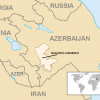Stories about Armenia from May, 2010
Caucasus: Armenia, Azerbaijan, Georgia make Eurovision Top Ten
This year's Eurovision Song Contest drew to a close on a Saturday in a televised final which attracted around 125 million viewers worldwide. But while some media reported lagging interest in the 54-year-old competition and concerns about spiraling costs, countries such as Armenia, Azerbaijan and Georgia continue to take it very seriously indeed.
Caucasus: Eurovision Semi-final roundup
Unzipped: Gay Armenia offers its opinion on last night's semi-final in this year's Eurovision Song Festival, and especially the entries from Armenia, Azerbaijan and Georgia. The blog, which has become a mainstay for covering the competition in the Caucasus region, also regularly tweets on it at @unzippedblog.
Caucasus: Social media, cleavage, and rare unity in Eurovision
Although last night's second semi-final for this year's Eurovision Song Contest has been and gone, Twitter was alive with commentary and updates throughout. The annual international competition, noted more for its kitsch entries than for its music, is viewed by well over 100 million people worldwide. Its presence online is nowhere near as large, but is increasingly becoming an important consideration.
Armenia: LGBT rights abroad, homophobia at home
Posting news of a Armenian LGBT conference in the U.S., Unzipped: Gay Armenia also posts a photograph and comments on homophobic leaflets and posters from an ultra-nationalist group appearing in Yerevan, the Armenian capital.
Caucasus: Eurovision girl power
Ianyan comments on this week's Eurovision Song Contest to be held in Oslo, Norway. Noting the often cheesy nature of the international music competition, the blog takes a look at the two female acts from Armenia and Azerbaijan, currently among the main entrants considered to have a chance to win.
Caucasus: Eurovision Social Media
With the first semi-final in this year's Eurovision Song Contest due to take place tomorrow, activity on blogs, social media networks and micro-blogging sites in support of entrants from Armenia, Azerbaijan and Georgia, the three countries making up the South Caucasus, is naturally increasing. However, their use also sometimes reflects the geopolitical and technical realities of the region.
Armenia-Azerbaijan: Conflict transformation
For the past two years Global Voices has covered the use of new and social media to overcome differences between Armenians and Azerbaijanis still locked in conflict over the disputed territory of Nagorno Karabakh. Most recently, it presented on the use of new online tools in conflict resolution and transformation at conferences in Romania, Macedonia, Georgia and Chile.
Armenia-Azerbaijan: Eurovision impressions
Unzipped: Gay Armenia compares the entries from Armenia and Azerbaijan in this year's Eurovision Song Contest. The blog says that both female singers are beautiful, but their performances need some work before the semi-finals next week.
Armenia-Azerbaijan: Mafia & Society
Fatalin's Blog informs its readers about Mafia, a group game where some participants take on the role of the mafiosa and kill those who represent citizens while both sides deceive each other. Invented in Russia, and alluding to societies in both countries, the blog notes that the game is especially...
Caucasus: Eurovision Twitter
As this year's Eurovision Song Contest approaches, one way to keep up with the entries from the three countries making up the South Caucasus will be via Twitter. Armenia's entry, Eva Rivas, is at @EvaRivas2010 and currently has 110 followers, Azerbaijan's Safura Alizadeh is at @SafuraMusic with 338 followers at...
Diaspora: Youth and violence
Ianyan comments on yet another killing in Los Angeles and says that it's about time that Armenians stopped focusing on the past in order to resolve their problems in the here and now.
Armenia-Azerbaijan: Eurovision pondering
No stranger to controversy when it comes to Eurovision in light of the still unresolved conflict over the disputed territory of Nagorno Karabakh, popbitch wonders if Armenia and Azerbaijan can settle their differences in the international music competition. Meanwhile, writing on HayFanat, Armanski says that the professionalism behind Azerbaijan's entry...
Bulgaria: Update on Arevik Shmavonyan's Case
Maya's Corner posts a detailed update on the case of Arevik Shmavonyan, a pregnant Armenian citizen who is still being kept at the Special Centre for Temporary Accommodation of Foreigners in Busmantsi, and on the legal status of David Arutyunyan, Arevik's boyfriend.
Middle East: “Blood Borders”
Martin W. Lewis from GeoCurrent Event blog reviews Ralph Lewis’ “Blood Borders” article on the idea of a complete reshape of Middle East borders in order to fit more appropriately the ethnic and religious affiliations of the region.
Caucasus: Armenian-Azerbaijani coexistence
Georgian “Maybe” Time, a new blog from the Caucasus, comments on the experience of a friend from Azerbaijan who was recently chastised for her cooperation and communication with Armenians. Meanwhile, despite the still unresolved conflict between Armenia and Azerbaijan over the disputed territory of Nagorno Karabakh, Scary Azeri recounts meeting...
Armenia: Banned TV station online
Following its removal from the airwaves by the authorities in April 2002 despite international outcry, and after already experimenting with short broadcasts via mobile, The Armenian Observer reports that A1 Plus has begun testing broadcasting online via Livestream.
Caucasus: Google Translate in Armenian, Azerbaijani and Georgian
The Google Translate Blog announces the addition of five new alpha languages for its online translation service, including Armenian, Azerbaijani and Georgian. Likely to be considered in the same way in Azerbaijan and Georgia, The Armenian Observer applauds the move even at such an early stage and says the service...
Armenia-Azerbaijan: New media and conflict transformation
The Oxfam blog reports on the recent Social Media for Social Change conference and Social Innovation Camp held last month in Tbilisi, Georgia, and particularly comments on the work of Global Voices Online's Caucasus editor and the blogger behind Flying Carpets and Broken Pipelines in using new and social media...
Armenia: Ex-President’s Wild Games
Newly-revealed summer 2009 photos of ex-Soviet Armenia’s former president Robert Kocharian posing with hunted “wild game,” including a lion, in Tanzania have Armenian bloggers talking.



